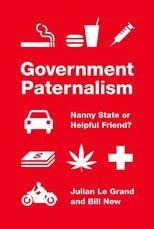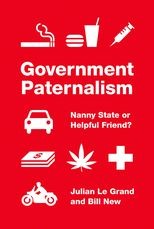Government Paternalism: Nanny State or Helpful Friend?
Government Paternalism: Nanny State or Helpful Friend?
Cite
Abstract
Should governments save people from themselves? Do governments have the right to influence citizens' behavior related to smoking tobacco, eating too much, not saving enough, drinking alcohol, or taking marijuana—or does this create a nanny state, leading to infantilization, demotivation, and breaches in individual autonomy? Looking at examples from both sides of the Atlantic and around the world, this book examines the justifications for, and the prevalence of, government paternalism and considers when intervention might or might not be acceptable. Building on developments in philosophy, behavioral economics, and psychology, the book explores the roles, boundaries, and responsibilities of the government and its citizens. It investigates specific policy areas, including smoking, saving for pensions, and assisted suicide. It then discusses legal restrictions on risky behavior, taxation of harmful activities, and subsidies for beneficial activities. The book pays particular attention to “nudge” or libertarian paternalist proposals that try to change the context in which individuals make decisions so that they make the right ones. It argues that individuals often display “reasoning failure”: an inability to achieve the ends that they set themselves. Such instances are ideal for paternalistic interventions—for though such interventions might impinge on autonomy, the impact can be outweighed by an improvement in well-being. Finally, the book rigorously considers whether the state should guide citizen decision making in positive ways and if so, how this should be achieved.
-
Front Matter
- 1 Introduction
-
2
What Is Paternalism?
-
3
Types of Paternalism
-
4
Paternalism in Practice
-
5
Paternalism and Well-Being
-
6
The Nanny State: The Challenge from Autonomy
-
7
Libertarian Paternalism
-
8
Paternalism and Policy
-
9
The Politics of Paternalism
- 10 Nanny State or Helpful Friend?
-
End Matter
Sign in
Personal account
- Sign in with email/username & password
- Get email alerts
- Save searches
- Purchase content
- Activate your purchase/trial code
Institutional access
-
Sign in through your institution
- Sign in with a library card Sign in with username/password Recommend to your librarian
Institutional account management
Sign in as administratorPurchase
Our books are available by subscription or purchase to libraries and institutions.
Purchasing information| Month: | Total Views: |
|---|---|
| November 2022 | 1 |
| November 2022 | 1 |
| November 2022 | 2 |
| December 2022 | 1 |
| January 2023 | 10 |
| January 2023 | 1 |
| January 2023 | 4 |
| January 2023 | 4 |
| January 2023 | 2 |
| January 2023 | 2 |
| March 2023 | 2 |
| April 2023 | 1 |
| May 2023 | 1 |
| May 2023 | 1 |
| May 2023 | 6 |
| May 2023 | 2 |
| June 2023 | 1 |
| June 2023 | 1 |
| October 2023 | 2 |
| November 2023 | 3 |
| November 2023 | 5 |
| November 2023 | 2 |
| November 2023 | 3 |
| November 2023 | 2 |
| November 2023 | 2 |
| November 2023 | 3 |
| November 2023 | 3 |
| November 2023 | 6 |
| November 2023 | 3 |
| January 2024 | 1 |
| January 2024 | 1 |
| February 2024 | 1 |
| February 2024 | 1 |
| February 2024 | 1 |
| March 2024 | 1 |
| March 2024 | 1 |
| April 2024 | 1 |




Get help with access
Institutional access
Access to content on Oxford Academic is often provided through institutional subscriptions and purchases. If you are a member of an institution with an active account, you may be able to access content in one of the following ways:
IP based access
Typically, access is provided across an institutional network to a range of IP addresses. This authentication occurs automatically, and it is not possible to sign out of an IP authenticated account.
Sign in through your institution
Choose this option to get remote access when outside your institution. Shibboleth/Open Athens technology is used to provide single sign-on between your institution’s website and Oxford Academic.
If your institution is not listed or you cannot sign in to your institution’s website, please contact your librarian or administrator.
Sign in with a library card
Enter your library card number to sign in. If you cannot sign in, please contact your librarian.
Society Members
Society member access to a journal is achieved in one of the following ways:
Sign in through society site
Many societies offer single sign-on between the society website and Oxford Academic. If you see ‘Sign in through society site’ in the sign in pane within a journal:
If you do not have a society account or have forgotten your username or password, please contact your society.
Sign in using a personal account
Some societies use Oxford Academic personal accounts to provide access to their members. See below.
Personal account
A personal account can be used to get email alerts, save searches, purchase content, and activate subscriptions.
Some societies use Oxford Academic personal accounts to provide access to their members.
Viewing your signed in accounts
Click the account icon in the top right to:
Signed in but can't access content
Oxford Academic is home to a wide variety of products. The institutional subscription may not cover the content that you are trying to access. If you believe you should have access to that content, please contact your librarian.
Institutional account management
For librarians and administrators, your personal account also provides access to institutional account management. Here you will find options to view and activate subscriptions, manage institutional settings and access options, access usage statistics, and more.